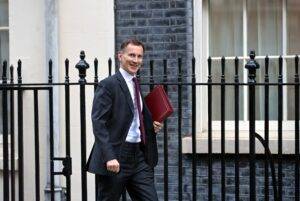
The UK economy exhibited signs of recovery as Gross Domestic Product (GDP) rose by 0.1 per cent in February, propelled by improved performance in both the production and services sectors.
According to the Office for National Statistics (ONS), GDP has now expanded for two consecutive months, following an upwardly revised 0.3 per cent growth in January. This positive trend suggests that the UK is gradually emerging from the recession it experienced in the latter half of the previous year, although the pace of recovery remains modest.
The services sector saw a 0.1 per cent increase in activity, while the production sector experienced a more notable growth of 1.1 per cent. However, the construction sector witnessed a contraction of 1.9 per cent, tempering overall growth for February. Over the three months leading up to February, GDP saw a 0.2 per cent increase.
Anticipation of interest rate cuts by the Bank of England in the near future, coupled with easing inflationary pressures, has stimulated demand within the UK economy. Inflation dropped to 3.4 per cent in February, exceeding expectations, while interest rates persist at a 16-year high of 5.25 per cent.
Jeremy Hunt’s tax cuts, implemented in April following the March budget, are expected to further stimulate demand. Additionally, forecasts predict a decline in inflation in the coming months, driven by reductions in average energy bills.
Liz McKeown, ONS’s director of economic statistics, highlighted the positive growth across manufacturing, particularly in the automotive sector, and in services such as public transport and telecommunications. However, she noted significant declines in construction due to adverse weather conditions.
Chancellor Jeremy Hunt expressed optimism about the economic progress reflected in the latest figures, emphasizing the importance of adhering to the government’s plan for sustained growth.
Despite these positive indicators, the UK’s growth trajectory remains modest compared to previous decades, influenced by factors such as high borrowing costs and lingering effects of the cost of living crisis. GDP is projected to grow by approximately 0.6 per cent this year, positioning the UK among the weakest performers in the G7.
Investor expectations for interest rate cuts by the Bank of England have moderated, reflecting concerns about inflation challenges in developed countries. Initial forecasts for six cuts have been revised down to around two, underscoring the complexity of returning inflation to the targeted 2 per cent level.
Read more:
UK Economy Shows Modest Growth Momentum with Second Consecutive Monthly GDP Increase





